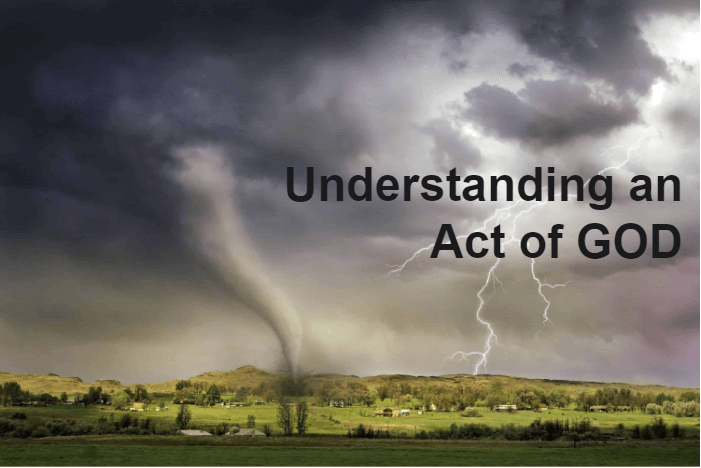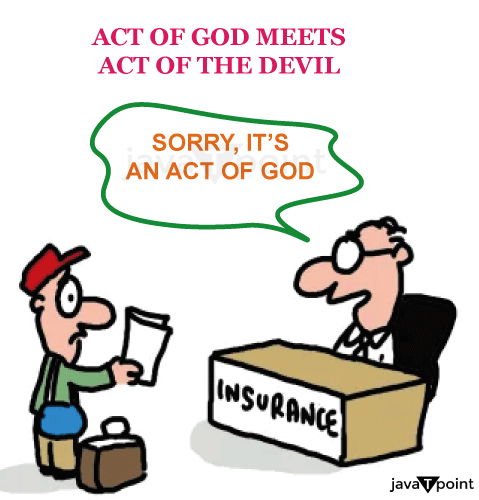What is an Act of God? With Example, Insurance CoverageUnderstanding Acts of GodEvents that take place as a result of uncontrollable natural forces are known as acts of God. They are exempt from guilt for the harm they produce since they are unexpected and unavoidable in legal and insurance situations. The idea of Acts of God is based on the knowledge that incidents brought on by natural processes cannot be attributed to humans. 
When a person or business is accused of negligence or breaching a contract, the defence of Acts of God may be raised in the courtroom. It acknowledges that some occurrences, like earthquakes or storms, are unavoidable and out of our control. Similarly to this, unless the policy expressly states otherwise, Acts of God are events that are ordinarily not covered by insurance. An occurrence must fulfil several requirements, such as being exclusively the result of natural forces, being unexpected, and being free from human involvement or influence to be considered an Act of God. These occurrences frequently involve the powerful forces of nature, such as hurricanes, severe storms, wildfires, floods, earthquakes, and flooding. Acts of God serve as a reminder that some situations are impossible for humans to foresee or prevent, highlighting the importance of having the right insurance coverage to lessen the financial burden of such occurrences. Examples of Acts of GodNatural occurrences that might cause harm and disruption are included in the "acts of God". While many events can be categorized as Acts of God, the examples below emphasize some of the most frequent ones: Natural Calamities
Unusual Weather Conditions
These examples emphasize the importance of having adequate insurance coverage to guard against the financial losses of Acts of God by highlighting the incredible strength and potential for destroying natural forces. Individuals, homeowners, and businesses can recover from such tragedies and reconstruct their lives with insurance plans to address specific risks. Insurance Protection Against Acts of GodDepending on the type of policy and the particular terms and conditions mentioned within, insurance coverage for Acts of God varies. Here are some typical Acts of God insurance coverage features, though policies can vary: Residence Insurance
Vehicle Insurance
Commercial InsuranceCommercial property insurance protects company assets, such as buildings, machinery, and stock, from listed perils, which may include natural disasters like earthquakes, fires, or hurricanes. Business interruption insurance can offer financial support if your company's operations are temporarily suspended due to an Act of God by making up for lost revenue and ongoing costs during the interruption. It is important to remember that insurance policies may contain restrictions and exclusions with respect to Acts of God. Certain high-risk places may have notable exclusions or higher rates due to the increased chance of certain natural events, and other hazards may require separate or supplemental coverage. It is crucial to tell your insurance provider to fully describe the damage using photos and written descriptions, and follow the correct claim filing processes specified by your insurer when making an insurance claim for damages brought on by an Act of God. The insurance company will evaluate the claim and award reimbursement based on the policy terms and the magnitude of the insured damages. Limitations and ExclusionsIn insurance plans, the terms "limitations" and "exclusions" relate to particular circumstances and conditions under which coverage may be reduced or omitted. It's critical to comprehend these restrictions and exclusions because they impact the scope of the insurance and prospective claims. Here are some essential things to think about: 
Policyholders must comprehend the restrictions and exclusions of an insurance contract to be aware of any possible coverage gaps. It is advised to study and interpret the policy documents thoroughly, speak with the insurance company or agent, and, if necessary, consider extra coverage choices. What is the difference between Force Majeure and Acts of God?The legal terms "force majeure" and "act of God" describe unforeseen circumstances that may affect contractual commitments. Although there are some similarities between the two, there are also some apparent differences: Force Majeure
Acts of God
The ConclusionNatural occurrences beyond human control that cause considerable harm and disruption are acts of God. Given the irrationality and power of these occurrences, insurance protection becomes essential for minimizing the economic effect. Individuals, homeowners, and companies must understand the restrictions, exclusions, and specific coverage offered by insurance plans to safeguard themselves from the effects of Acts of God.
Next TopicZero Coupon Bond
|
 For Videos Join Our Youtube Channel: Join Now
For Videos Join Our Youtube Channel: Join Now
Feedback
- Send your Feedback to [email protected]
Help Others, Please Share










